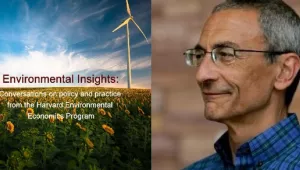CITATION AND REPRODUCTION
This document appears as Discussion Paper 91-05 of the Center for Science and International Affairs and as contribution E-91-02 to the Center's Environment and Natural Resources Program. CSIA Discussion papers are works in progress. Comments are welcome and may be directed to the author in care of the Center.
This paper may be cited as: Charles H.W. Foster, Kennedy School of Government and Peter P. Rogers, Division of Applied Sciences, Harvard University. "Rebuilding the Nation's Wetland Heritage: A Challenge for the 1990s." CSIA Discussion Paper 91-05, Kennedy School of Government, Harvard University, Revised, October 1991.
The views expressed in this paper are those of the authors and publication does not imply their endorsement by CSIA and Harvard University. This paper may be reproduced for personal and classroom use. Any other reproduction is not permitted without written permission of the Center for Science and International Affairs, Publications, 79 JFK Street, Cambridge, MA 02138, telephone (617) 495-1351 or telefax (617) 495-1635.
EXECUTIVE SUMMARY
Wetlands are a resource with important, overlapping, environmental, economic, and cultural functions and values that are in short and diminishing supply nationally. The need for protection has led to policies that favor on-site, in-kind regulation, neglecting the fact that most wetlands occur as area-wide, natural systems. The responsibility for wetlands is currently fragmented among numerous federal, state, and local agencies. An emphasis on achieving no net loss has overshadowed the real possibility of restoring or even creating wetlands: net gain. Thus, there is an urgent need for a well-articulated and properly coordinated, national program for the restoration, creation, and enhancement of wetlands to achieve a significant net gain in the nation's basic wetland supply by the turn of the century. Is such a goal attainable? We think so with modest but meaningful changes in direction and a comprehensive, coordinated approach nationally to wetland conservation, protection, restoration, and management.
Harvard University's Wetlands Policy Project has concluded that rebuilding the nation's once-abundant wetland heritage constitutes an important challenge that should be met by the close of the 1990s. Accomplishing this goal will require the following steps:
• planning for wetlands by whole bioregions using the full array of public and private agencies to undertake the needed restoration actions and with the private development community engaging positively in the effort;
• self-financing of wetland conservation programs where feasible, establishment and use of wetland banks, and the possible creation of a National Wetlands Trust Fund to support the large-scale preservation efforts needed;
• greater use of constructed wetlands in conjunction with sewage treatment, landfill, and non-point source control projects;
• institutional changes to enable the creation of a National Wetlands Council and federal-state regional wetland councils as representative forums for coordination and leadership, a revision of the 1977 Executive Order 11990 (Protection of Wetlands), and enactment of a specific title for wetlands in the Clean Water Act reauthorization.
Foster, Charles. “Rebuilding the Nation's Wetland Heritage: A Challenge for the 1990s.” Harvard Kennedy School, August 1, 1991





